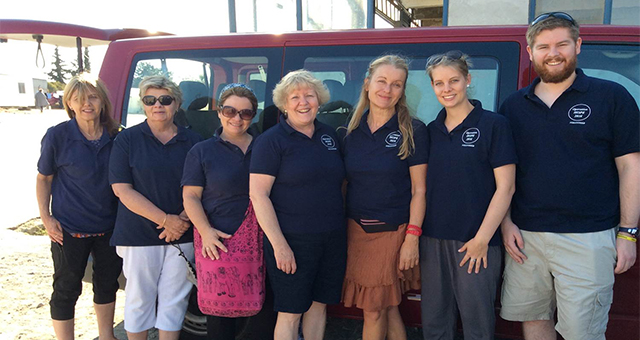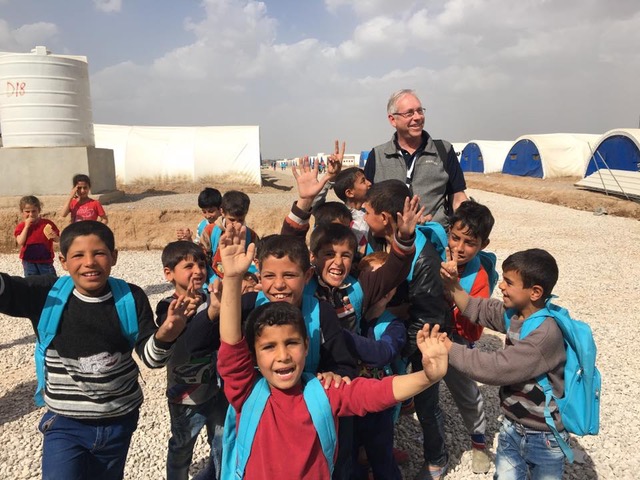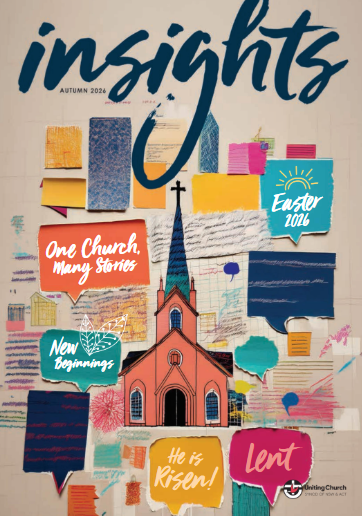It was two years ago when shocking images emerged of Alan Kurdi, a small three year old lifeless body laid face down on a Turkey beach.
Images of anguished people forced to flee their homes and some dying in the process flicker past our screens constantly. In some ways we have become accustomed to these images. It has sadly become the new normal. However people are still fleeing violence and terror.
Toronto Uniting Church (Newcastle NSW) member Erica Henley along with six other volunteers, having heard stories, visiting detention centres and advocating for refuges in church communities, decided it was time to take action and launch “Operation Hope”.
Operation Hope is a group of self-funded Australian volunteers that raises funds with 100% of the proceeds going to buying and delivering medical equipment, supplies, educational resources, food and clothing to the places that most need it.
On their first volunteer run last year, the group travelled to Greece with Adventist Help, an ADRA NGO charity that was started 18 months ago by two South African brothers including Dr Michael-John Von Horsten.

In Greece there are over 60,000 refugees across 40 refugee camps. Adventist Help converted a large container converted into a medical clinic where Operation Hope members volunteered.
Preparing for the trip, Erica said it was the personal friendships members had with people who were refugees that helped them comprehend the scenes they would be confronted with on their trip.
“They [friends] would describe the situation, so visually we were already pre-warned or a little bit educated as to what we could expect,” said Erica.
However, what shocked Erica in Greece was knowing that billions of funds had gone through organisations and the local government to care for refugees arriving yet their situation still looked grim.
“Really you couldn’t equate where that money had gone when you looked at the sort of conditions they were living in,” said Erica.
Erica spoke about meeting people who had fled beheadings and one refugee Erica remembered vividly was a police officer whose child had been kidnapped, “…and this was a 12 year old boy who was actually in the school in the refugee camp,” said Erica in disbelief.
Looking into the faces of the refugees Erica explained that you could see how they’ve aged beyond their years and been left with nothing but the clothes on their back.
Despite this, the people made the best of what they had and would invite the Operation Hope volunteers and others into their tents and offer tea, coffee or watermelon.
“They were no expectations of you being able to fix anything because you couldn’t really, but it was just that they could once again tell their story,” said Erica.

Psychological damage
A recent report by Save the Children showed an in-depth look into the impact on the mental health of Syrian children after six years of ongoing war.
The Save the Children Vice President of the humanitarian response, Greg Ramm, spoke to the HuffPost about the creation of animation series to highlight to the public the psychological toll on refugee children (see video below).
“…reports and statistics and numbers can be numbing. What the images are trying to do is to take those numbers and put a name and face of a child to them, and make it real,” said Mr Ramm.
It’s not just food and shelter that people in this situation require, something we forget is the inner and psychological scars.
“There is going to be a whole generation of children who at a very early age have witnessed beheadings and in fact at times were under gunpoint had to do the beheadings themselves. You just kind of think how can children like that move forward from that experience and live a normal life,” said Erica.
There is a real need for more psychological help for these children.
Erica admits that for volunteers seeing the effect of war on people especially children can be confronting but it is what drives volunteers to return to do more work.
“Many of them [volunteers] then go devote time on annual basis to return or they go volunteer full time,” said Erica.
On the road to Iraq
On the 3rd of May Operation Hope will again be providing support to refugees overseas this time in Northern Iraq.
They will be joining Adventist Help’s Dr Michael-John Von Horsten, who after consultation with the department of health, the Iraqi army and Peshmerga soldiers, was able to set up a field hospital in Erbil, east of Mosul, Iraq.
This new field hospital will be a hub for the five or six refugee camps.
Almost 100,000 Iraqis have been displaced in the last month after fleeing ISIL in western Mosul. With an influx of people fleeing there is a plea for any international organisations to assist.
This time Operation Hope will have five Australian volunteers including Erica. They will also be joined by five Americans who also volunteered in Greece at the same time as them last year.
“Our medical volunteers will work in the field hospital; they’re starting from scratch with absolutely nothing in terms of medical equipment,” said Erica.

Want to help?
Erica explained that even though some volunteers are seasoned medical personnel and other humanitarian there is still so much that those who want to help can do on the ground. Especially in Greece there is help needed within the schools, clothes and food distribution teams.
Operation Hope members have been raising money through Uniting Church congregations and through generous donations and contacts on the ground in both Greece and now Iraq have been able to deliver much needed clothes and medical supplies.
“[In Greece] we have been able to fund an X-ray machine and a digital processing machine to process the x-ray onto computers,” said Erica.
They have also successfully delivered an ultrasound machine medical care for pregnant women and ISTAT machine for pathology tests.
If you have questions about volunteering or would like to donate through Operation Hope, contact Erica Henley erica.henley@bigpond.com.
Matthew 25:35-36: 35 For I was hungry and you gave me something to eat, I was thirsty and you gave me something to drink, I was a stranger and you invited me in, 36 I needed clothes and you clothed me, I was sick and you looked after me, I was in prison and you came to visit me.
Cover picture: School children in refugee camp, Oinofyta, Greece in 2016 (Supplied).
For more information
Hear Dr Michael-John Von Horsten speak https://vimeo.com/170958894
Melissa Stewart





